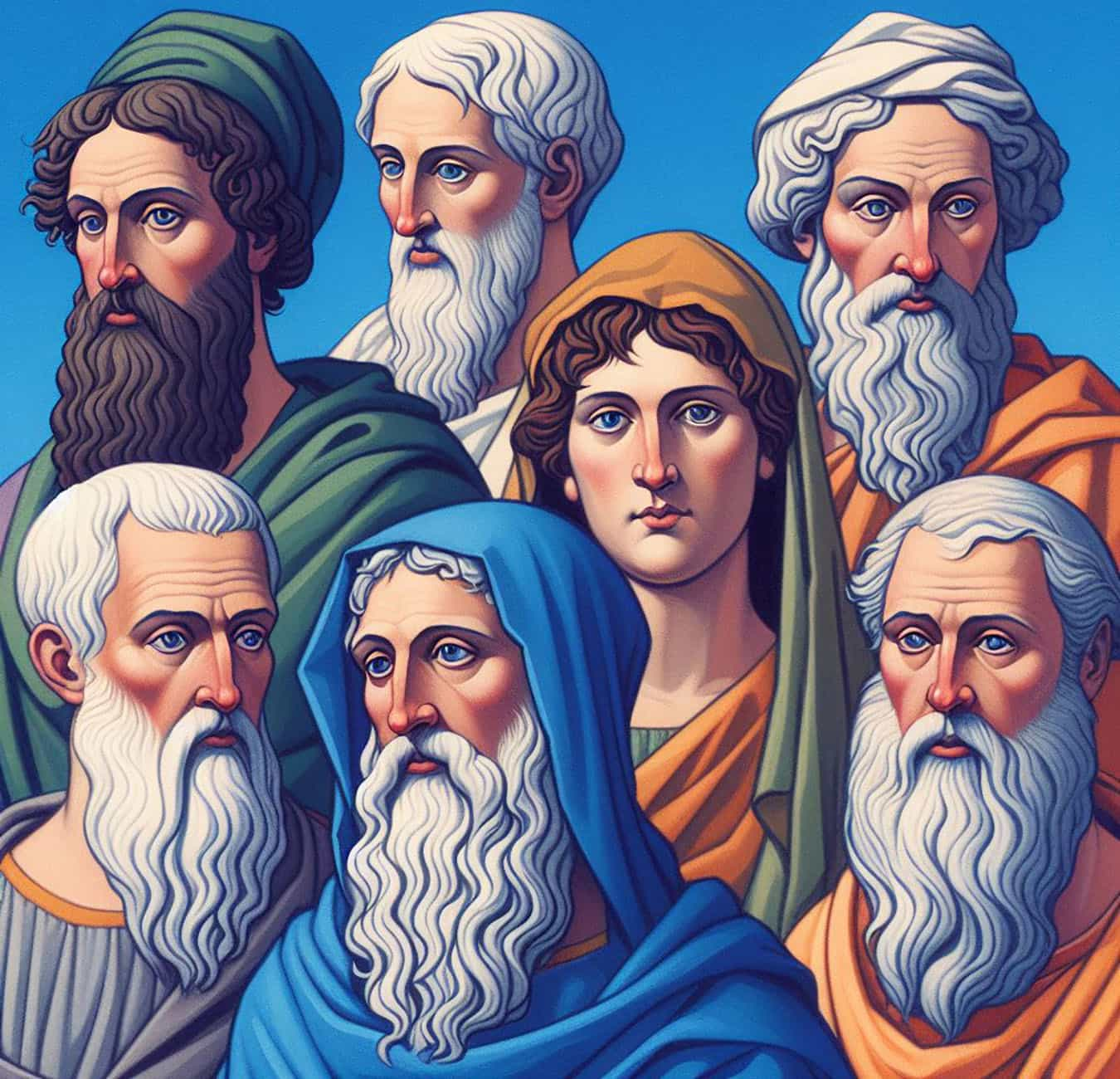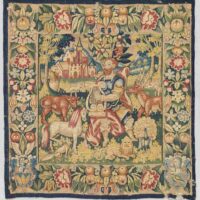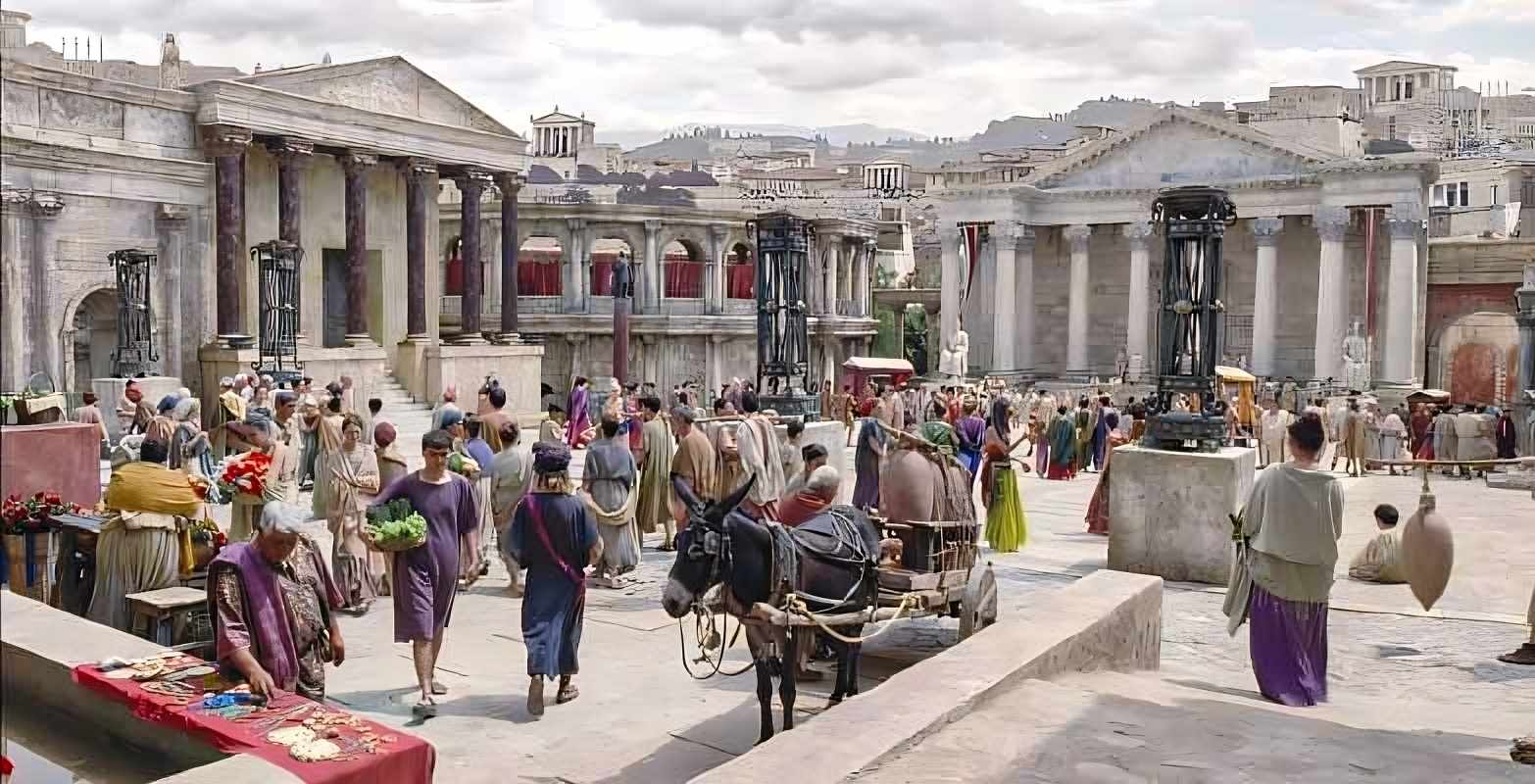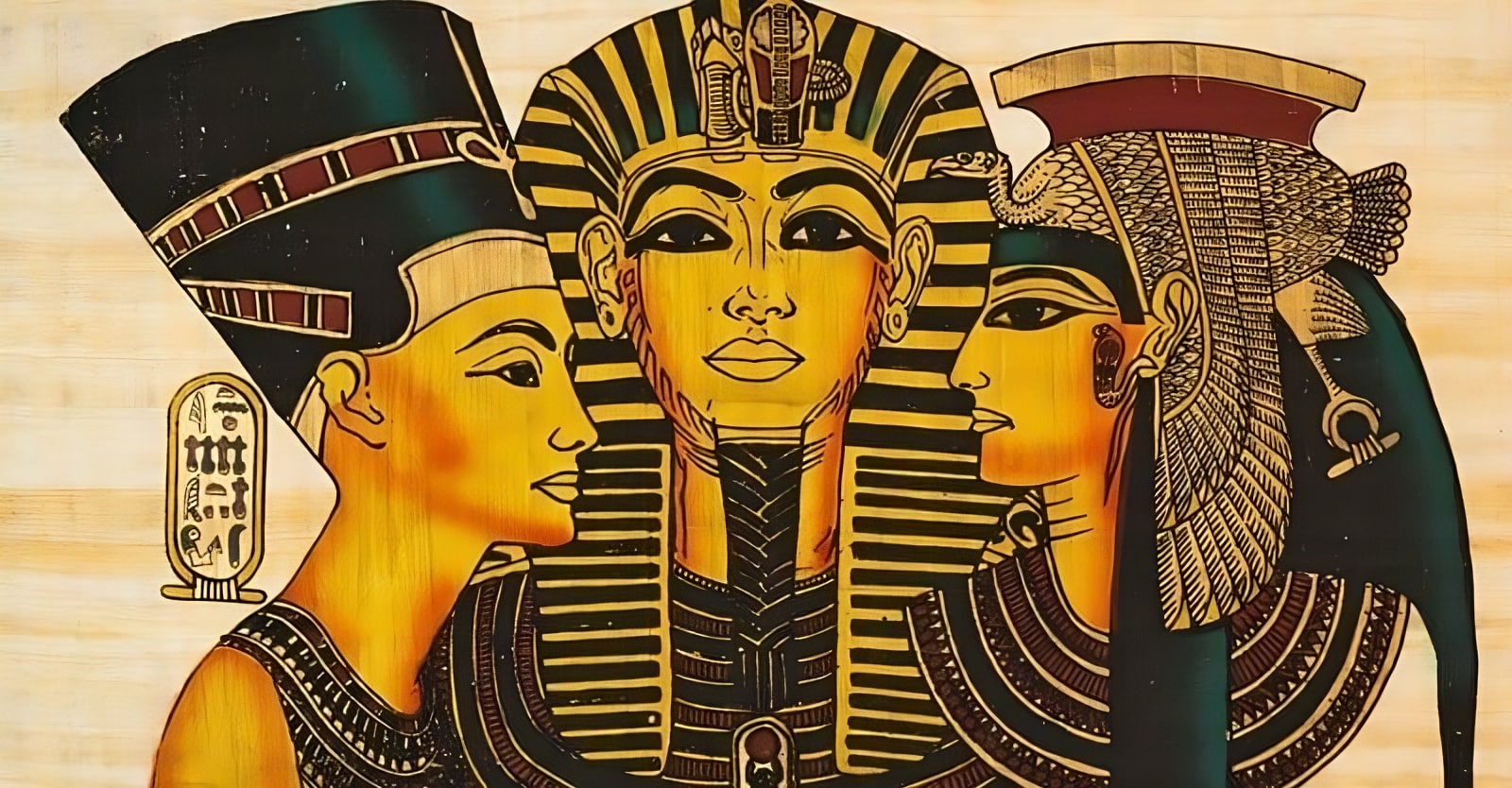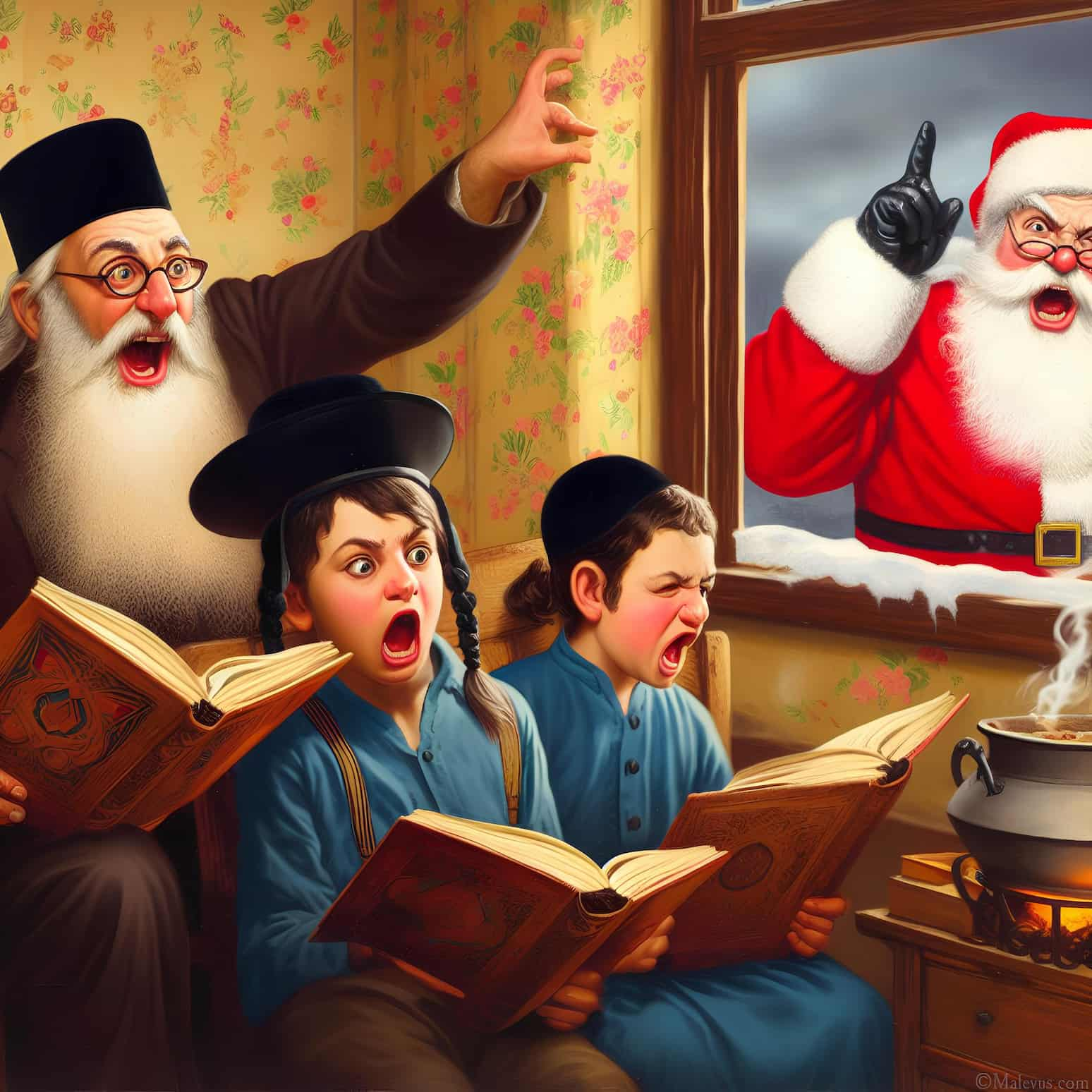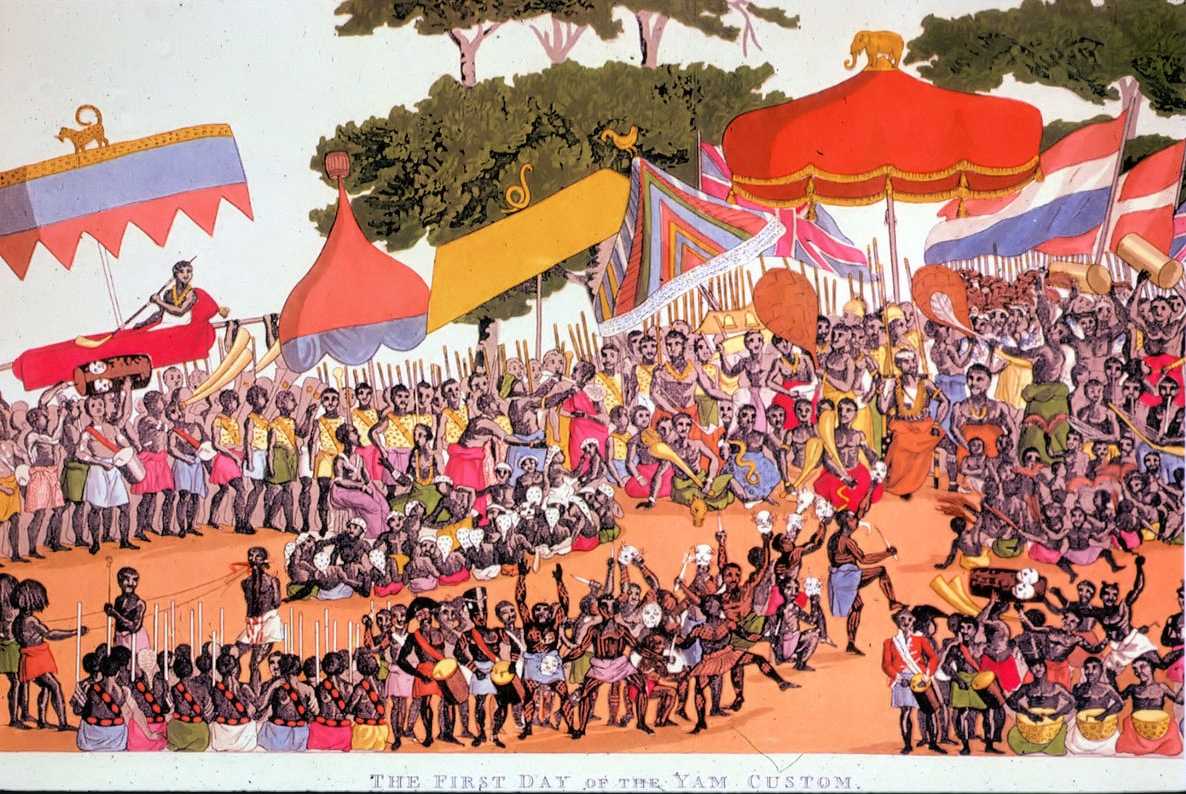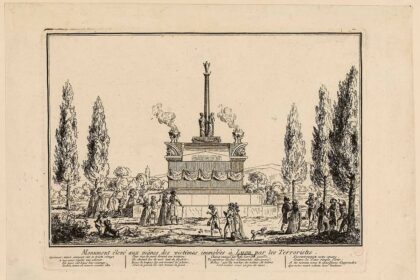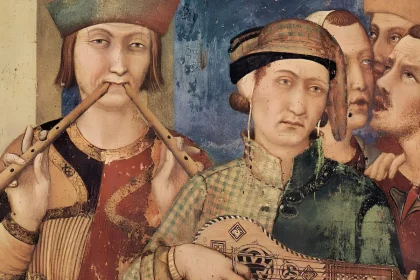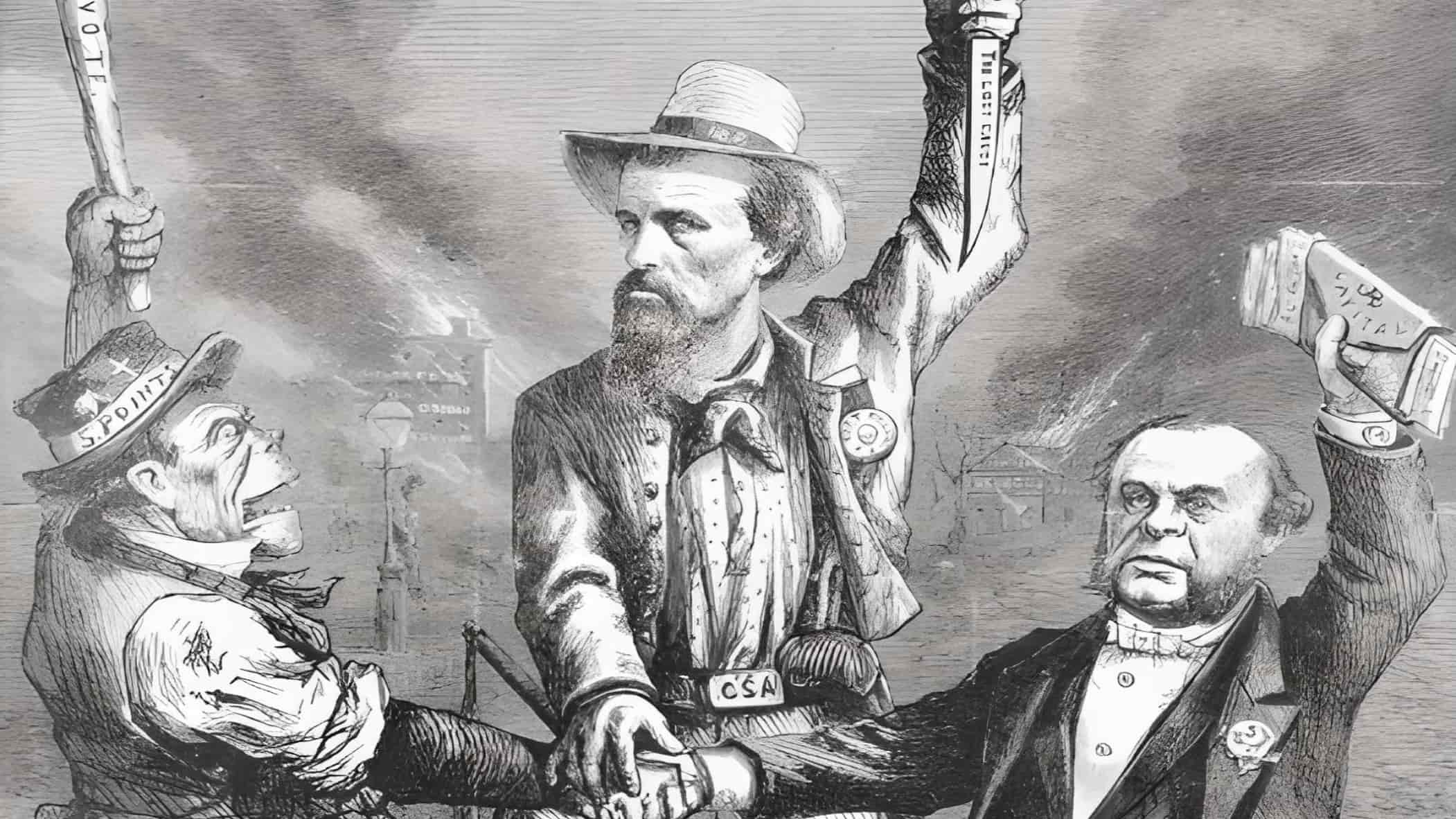The Seven Sages of Greece (in Ancient Greek οἱ ἑπτά σοφοί, around 620-550 BCE) are the title given by Greek tradition to a group consisting of politicians, lawmakers, and pre-Socratic philosophers of ancient Greece. They are referred to as the sylloge (Ancient Greek: συλλογή, assembly, gathering) of the Seven Sages. The composition of this group may have varied over the centuries and traditions.
This tradition was adopted, albeit in a different form, by the Christian tradition in the early days of Christianity. Moreover, it also lives on through a whole series of iconographic representations in sculpture and mosaic. Their number is found in the Seven Wonders of the World, the Seven against Thebes, or the Saptarishis (the “seven sages (rishi)”) in India.
Origin
The Seven Sages are mentioned explicitly for the first time by Plato. In his dialogue “Protagoras” (343a), he lists them as follows:
- Thales of Miletus
- Pittacus of Mytilene
- Bias of Priene
- Solon of Athens
- Cleobulus of Lindos
- Mysus of Chenae (or Chen)
- Chilon of Sparta
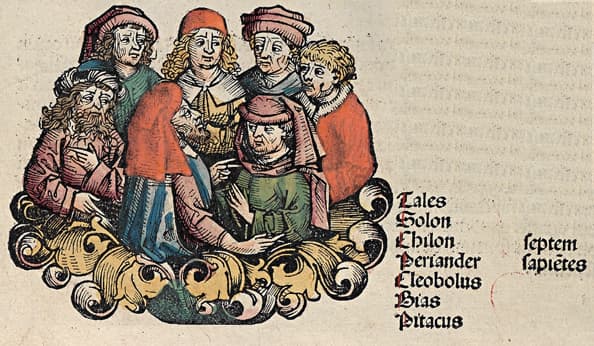
It is debated whether the idea of such a list of seven originates from Plato himself or if he relied on a popular tradition from the sixth or early fifth centuries. The individual names also appear in older sources, most notably in Herodotus, but they do not appear as a group there.
Prominent among them were Thales, a natural philosopher and mathematician, and Solon, a lawmaker. All lists mention Thales, Solon, Bias, and Pittacus, and most also include Cleobulus and Chilon. Mysus was a vague figure for posterity and hailed from an unknown village. Presumably for this reason, he was replaced in a list, first appearing with Demetrius of Phalerum, a student of Aristotle, by Periander of Corinth.
According to another hypothesis, which was already present in antiquity, Plato replaced Periander, who was already present in the original version but politically unpopular due to his tyrannical rule, with Mysus. Demetrius’ list, consisting of Thales, Pittacus, Bias, Solon, Cleobulus, Chilon, and Periander, had the widest circulation in antiquity and is still common today.
In addition, there were other lists circulating that included different names instead of Mysus or Periander, and sometimes instead of Chilon and Cleobulus. Occasionally, the following personalities were also counted among the Seven Sages:
- Epimenides
- Anacharsis
- Leophantus
- Aristodemus
- Pherecydes of Syros
- Pythagoras of Samos
- Anaxagoras
- Acusilaus of Argos
- Lasus of Hermione
- Orpheus
- Epicharmus
- Peisistratus
- Linus
- Pamphilus
Occasionally, further names were also mentioned.
Generalities
The composition of the Sages’ sylloge varied. It is found in different texts, which, however, present a common element: their legendary nature, but also with a semi-historical substrate. The characters included in the sylloge generally come from either the Aegean islands and coastal cities of Asia Minor or from mainland Greece.
There are other series of sages, such as the Apkallu, learned artisans in Mesopotamian and Akkadian literature. In Sanskrit literature, texts mention seven rishis, who are at once seers, poets, mystics, priests, and, literally, stars (the Pleiades).
The tradition of the Sages
Interest in the lives and words of the sages dates back to the archaic period, as evidenced by both the legend of the Seven Sages and the transmission of their sayings. Indeed, during the 5th century BCE (or perhaps already in the 6th century BCE), philosophers and historians transmitted the idea that seven sages lived at the court of Croesus (d. 546 BCE) or that they gathered at the sanctuary of Apollo at Delphi to offer him their sayings, or even with this or that tyrant.
This group of individuals would have in common being masters of practical wisdom, for some men of science and for most men of state. The list would have been definitively completed in the 4th century BCE in Athens. According to Jean Stobaeus, a doxographer of the 5th or 6th century BCE, it was Demetrius of Phalerum who fixed the list of the Seven Sages, thus making it a kind of canon by publishing a collection of their sayings.
Plato provides the oldest list of the Seven Sages that has come down to us, but others are found, and the lists as well as the attributions of the sayings vary. In any case, according to Demetrius of Phalerum, the tradition would be much older. The Seven Sages were known for their practical wisdom and memorable sayings and maxims. According to Dicaearchus, a student of Aristotle, the Seven Sages are neither philosophers nor wise men, but good lawmakers and insightful men.
It is probably at Delphi that their reputation for wisdom was established: several of their maxims were engraved on the site in the 5th and 4th centuries BCE, at a time when, instead of the knowledge reserved for the god, the skillful use of the present moment was preferred.
Lists and Maxims of the Sages
According to Diogenes Laërtius, in his Life of Thales:
“There is no agreement on their number. Leander, instead of Cleobulus and Myson of Chenae, includes Leophantes, son of Gorsias, or Lebedius of Ephesus and Epimenides of Crete. Plato, in the Protagoras, substitutes Myson for Periander. The historian Ephorus of Cyme replaces Myson with Anacharsis, and others add Pythagoras.
According to Dicaearchus, there are four on whom everyone agrees: Thales, Bias of Priene, Pittacus of Mytilene, and Solon. The same author names six others, from which he chooses three: Aristodemus, Pamphile, the Spartan Chilon, Cleobulus, Anacharsis, and Periander. Others add Acusilaus, Caba, or Scala, an Argive.
Hermippus, in his book on the sages, says there were seventeen and that each person chose seven according to their preferences. These are Solon, Thales, Pittacus, Bias, Chilon, Cleobulus, Periander, Anacharsis, Acusilaus, Epimenides, Leophantes, Pherecydes, Aristodemus, Pythagoras, Lasus, son of Charmantides or Sisambrinus, or, according to Aristoxenus, of Chabrines, Hermon, and Anaxagoras.
Hippobotus (Catalogue of Philosophers) lists them as follows: Orpheus, Linus, Solon, Periander, Anacharsis, Cleobulus, Myson, Thales, Bias, Pittacus, Epicharmus, and Pythagoras.”
Only fragments of Solon’s work have reached us. For the other names on the shortlist given by Plato, we only have maxims and sayings (apophthegms – from Ancient Greek ἀπόφθεγμα / apophthegma) attributed to them. These apophthegms most often take the form (in Greek) of two-word injunctions, or barely more in the series transmitted by Dicaearchus.
Summary Table
In bold, the four names appear on all the lists that have reached us. This list corresponds to that given by Plato, except for Corinthian Periander, replaced by Myson of Chenae in Plato’s list. This is also the one taken up by Paul Faure.
| Wise | Maxim | Translation |
|---|---|---|
| Thales of Miletus | Ἐγγύα, πάρα δ᾽ ἄτα. | “Never be surety” or “You will never be surety.” |
| Pittakos of Mytilene | Γίγνωσκε καιρόν. | “Recognize the opportunity.” |
| Bias de Priène | Οἱ πλεῖστοι κακοί. | “The most numerous are the wicked,” or “Most men are evil.” |
| Solon of Athens | Μηδὲν ἄγαν. | “Nothing too much.” |
| Chilon of Sparta | Γνῶθι σεαυτόν. | “Know thyself.” |
| Periander of Corinth | Μελέτη τὸ πᾶν. | “Caution in all things.” |
| Cleobulus of Lindos | Μέτρον ἄριστον. | “Moderation is the highest good.” |
Often, to these seven names, those of Epimenides of Crete, Pherecydes of Syros, and Aesop are added. As for Book I of Lives, Doctrines, and Sayings of Famous Philosophers by Diogenes Laërtius, entitled “The Seven Sages,” it deals with eleven characters: Thales, Solon, Chilon, Pittacus, Bias, Cleobulus, Periander, Anacharsis, Myson, Epimenides, and Pherecydes.
Other maxims
Let us mention other maxims attributed to the Seven Sages: “Control your anger,” “Reflect on the end of life.” Moreover, in the baths of the Seven Sages, in Ostia, they are represented in a painting accompanied by scatological aphorisms attributed to them, undoubtedly to mock them.
Maxims and Sayings of the Seven Sages
In addition to their political contributions to their hometowns, the fame of the wise men was particularly enhanced by the maxims and aphorisms attributed to them. Orators quoted them in politics and in court. Plato himself praised the concise and skillfully formulated sayings, the gnomic wisdom, as outstanding fruits of the wisdom of the seven men.
According to the prologue of “Ludus Septem Sapientum” (The Play of the Seven Sages) by the Roman poet Ausonius, a Ludius (a “lively person”) appears, who enumerates the well-known sayings of the Seven Sages.
Among other things, the following sayings were often quoted both in private and in public:
Thales
- Ἐγγύα πάρα δ’ ἄτα. “Surety brings ruin.”
- Do not adorn yourself outwardly, but be beautiful in your deeds.
- What you do good for your parents, expect the same from your children in your old age.
- Do not be lazy, even if you have money.
- Better to be envied than pitied.
Solon
- Μηδὲν ἄγαν. “Nothing in excess.”
- Do not sit in judgment, lest you become an enemy to the condemned.
- Avoid pleasure that brings forth pain.buy zydena online https://buynoprescriptionrxonline.net/buy-zydena.html no prescription pharmacy
- Do not have more rights than your parents.
- Learn to obey, and you will know how to rule.
Chilon
- Γνῶθι σεαυτόν. “Know thyself.”
- Go slowly to your friend’s festivities, quickly to their distress.
- Do not let your tongue outrun your mind.
- Do not gesture while speaking; it seems as if you are insane.
- Reconcile in injustice, resist in insolence.
Pittacus
- Γίγνωσκε καιρόν. “Know the right time.”
- Do not speak of your plans; if they fail, you will be laughed at.
- Do not do to others what you find hateful.
- Do not speak ill of your friend or good of your enemy, for that would be illogical.
- The land is reliable, the sea is not.
Bias
- Οἱ πλεῖστοι κακοί. “Most men are bad.”
- Look in the mirror: if you look handsome, you must also do good deeds; if ugly, you must compensate for nature’s deficiency by being noble.
- Proceed slowly to work, but persevere in what you have begun.
- Win through persuasion, not through force.
- Attribute the good you have to the gods, not to yourself.
Cleobulus
- Μέτρον ἄριστον. “Moderation is best.”
- Listen much and speak little.
- Consider the opponent of the people as an enemy.
- Marry from an equal rank; from a higher rank, you gain masters, not relatives.
- In prosperity, do not be proud; in adversity, do not be lowly.buy vibramycin online https://buynoprescriptionrxonline.net/buy-vibramycin.html no prescription pharmacy
Periander
- Μελέτη τὸ πᾶν. “Consider everything.”
- Everything is practice.
- Pleasures are fleeting, virtues immortal.
- Scold in such a way that you can quickly become friends again.
- Adhere to old laws, but to fresh food.
Plutarch’s Feast of the Seven Wise Men
The wisdom of the Seven Sages played a role in philosophical discussions about the best state. Plutarch addresses this in his dialogue “The Feast of the Seven Wise Men”:
When asked about the best state, the Seven Sages responded differently:
- Solon: “The state in which a criminal is accused and punished by all, those whom he has harmed and those whom he has not.”
- Bias: “Where all fear the law as if it were a tyrant.”
- Thales: “One that has neither too many rich nor too many poor.”
- Anacharsis: “Where everything else is valued equally, but virtue is preferred and vice is penalized.”
- Cleobulus: “Where the citizens fear reproach more than the law.”
- Pittacus: “Where it is not possible for the wicked to rule, nor for the good not to rule.”
- Chilon: “The one that listens most to laws and least to orators.”
When asked about the best household, six of the Seven Sages responded:
- Solon: “Where acquiring money does not involve injustice, guarding it does not involve mistrust, and spending it does not lead to regret.”
- Bias: “Where the master behaves as if he were outside because of the laws.”
- Thales: “Where the master can have the most leisure.”
- Cleobulus: “Where the master has more loved ones than those who fear him.”
- Pittacus: “That desires nothing superfluous and lacks nothing necessary.”
- Chilon: “That most resembles a state ruled by a king.”
Reception
The conviction that optimal governance requires the advice of wise individuals has persisted to this day. The designation “The (Seven) Wise Men” is used for advisory bodies of various kinds, such as the annual report of the “Council of Economic Advisers” in Germany. Similarly, in a Swiss project for Expo.02, “The Seven Wise Men” consisted of a group of seven scientists, artists, and representatives of political bodies tasked with researching the thoughts, feelings, and actions of Swiss citizens.
Legacy
In the 17th century, Madeleine and Georges de Scudéry staged the Seven Sages in their epic novel Artamène or the Grand Cyrus (1649-1653), notably in the episode of the Banquet of the Seven Sages.



